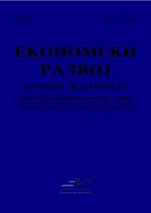Трговските односи на земјите од југоисточна Европа
Trade relations of the South Eastern Europe`s countries
Author(s): Iskra Stanceva-GivovSubject(s): Economy
Published by: Економски институт - Скопје
Keywords: Intra-regional trade; South Eastern Europe; trade liberalization; economic integration;
Summary/Abstract: In this paper we analysed the existing level of economic integration of South Eastern Europe and try to argue why economic cooperation should be actively encouraged. Among the countries of South Eastern Europe, despite the geographical proximity, there is a very low level of economic integration. Since the economic status of these countries is very poor, a revival of regional economic cooperation through intensification of trade, realization of regional investment projects and greater inflow of FDI, could faster economic growth in these countries. This would reduce the income gap in relation to those countries which will join EU earlier, and create conditions for a faster integration of South Eastern Europe with EU. The paper has analysed the effects of the ongoing parallel processes of trade liberalisation in South Eastern Europe's countries mutual trade and their trade with the EU. For one group of South Eastern Europe's countries - primarily Bosnia and Herzegovina, Republic of Macedonia, and Serbia and Montenegro - intra-SEE trade has remained an important part of their overall trade, despite disintegration, imposition of trade and non-trade barriers, and continuous conflicts. The most recent trends in South Eastern Europe's countries trade patterns confirm the importance of regional markets primarily for the successor states of former Yugoslavia. Since several South Eastern Europe's countries have registered an increase in intra-SEE exports in recent years, this lead to the conclusion that the Stability Pact's trade liberalisation initiative has indeed stimulated trade with neighbouring countries. On the other hand, the MoU trade liberalisation has had no impact whatsoever on region trade of Albania, Bulgaria, and Romania. Even if the South Eastern Europe region, however we define it, today does, not qualify as an economically integrated region, this does not mean that trade liberalisation will not be beneficial and will not lead to its greater integration in the future. Independently of the economic potential for increasing trade in South Eastern Europe, trade liberalisation can have a number of positive effects, both political and economic.
Journal: Економски Развој - Economic Development
- Issue Year: 10/2008
- Issue No: 1
- Page Range: 95-116
- Page Count: 22
- Language: Macedonian

